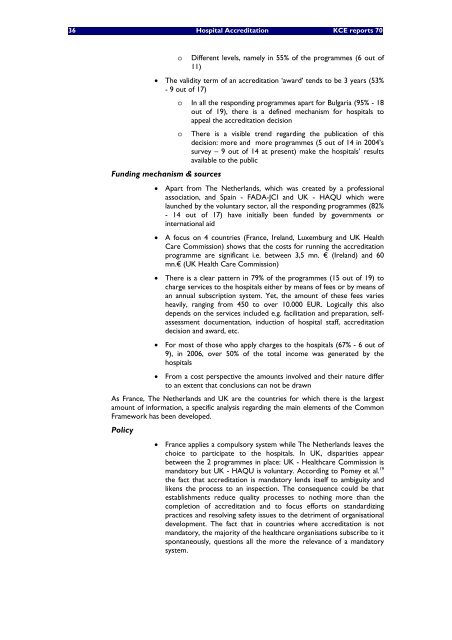Vergelijkende studie van ... - KCE
Vergelijkende studie van ... - KCE
Vergelijkende studie van ... - KCE
Create successful ePaper yourself
Turn your PDF publications into a flip-book with our unique Google optimized e-Paper software.
36 Hospital Accreditation <strong>KCE</strong> reports 70<br />
o Different levels, namely in 55% of the programmes (6 out of<br />
11)<br />
• The validity term of an accreditation ‘award’ tends to be 3 years (53%<br />
- 9 out of 17)<br />
o In all the responding programmes apart for Bulgaria (95% - 18<br />
out of 19), there is a defined mechanism for hospitals to<br />
appeal the accreditation decision<br />
o There is a visible trend regarding the publication of this<br />
decision: more and more programmes (5 out of 14 in 2004’s<br />
survey – 9 out of 14 at present) make the hospitals’ results<br />
available to the public<br />
Funding mechanism & sources<br />
• Apart from The Netherlands, which was created by a professional<br />
association, and Spain - FADA-JCI and UK - HAQU which were<br />
launched by the voluntary sector, all the responding programmes (82%<br />
- 14 out of 17) have initially been funded by governments or<br />
international aid<br />
• A focus on 4 countries (France, Ireland, Luxemburg and UK Health<br />
Care Commission) shows that the costs for running the accreditation<br />
programme are significant i.e. between 3,5 mn. € (Ireland) and 60<br />
mn.€ (UK Health Care Commission)<br />
• There is a clear pattern in 79% of the programmes (15 out of 19) to<br />
charge services to the hospitals either by means of fees or by means of<br />
an annual subscription system. Yet, the amount of these fees varies<br />
heavily, ranging from 450 to over 10.000 EUR. Logically this also<br />
depends on the services included e.g. facilitation and preparation, selfassessment<br />
documentation, induction of hospital staff, accreditation<br />
decision and award, etc.<br />
• For most of those who apply charges to the hospitals (67% - 6 out of<br />
9), in 2006, over 50% of the total income was generated by the<br />
hospitals<br />
• From a cost perspective the amounts involved and their nature differ<br />
to an extent that conclusions can not be drawn<br />
As France, The Netherlands and UK are the countries for which there is the largest<br />
amount of information, a specific analysis regarding the main elements of the Common<br />
Framework has been developed.<br />
Policy<br />
• France applies a compulsory system while The Netherlands leaves the<br />
choice to participate to the hospitals. In UK, disparities appear<br />
between the 2 programmes in place: UK - Healthcare Commission is<br />
mandatory but UK - HAQU is voluntary. According to Pomey et al. 19<br />
the fact that accreditation is mandatory lends itself to ambiguity and<br />
likens the process to an inspection. The consequence could be that<br />
establishments reduce quality processes to nothing more than the<br />
completion of accreditation and to focus efforts on standardizing<br />
practices and resolving safety issues to the detriment of organisational<br />
development. The fact that in countries where accreditation is not<br />
mandatory, the majority of the healthcare organisations subscribe to it<br />
spontaneously, questions all the more the rele<strong>van</strong>ce of a mandatory<br />
system.

















